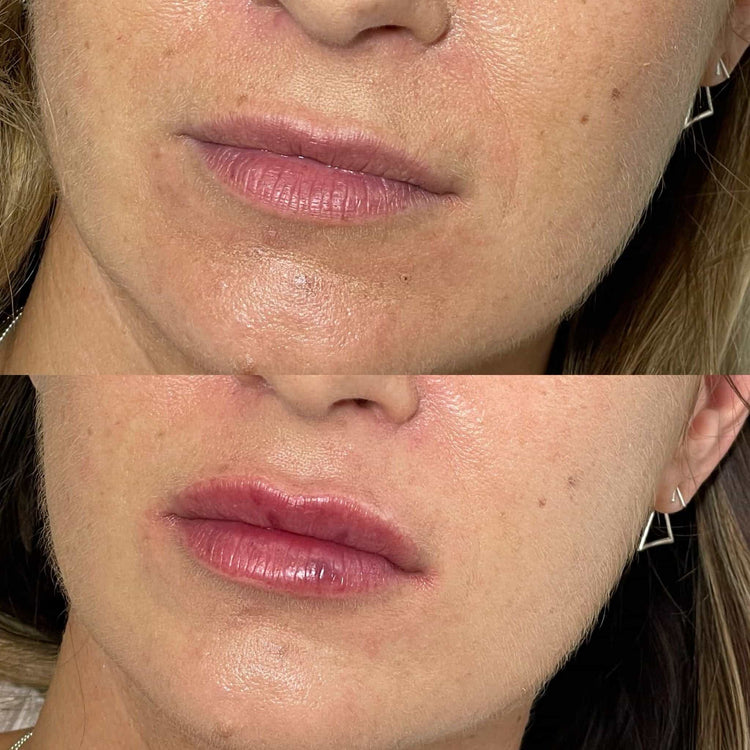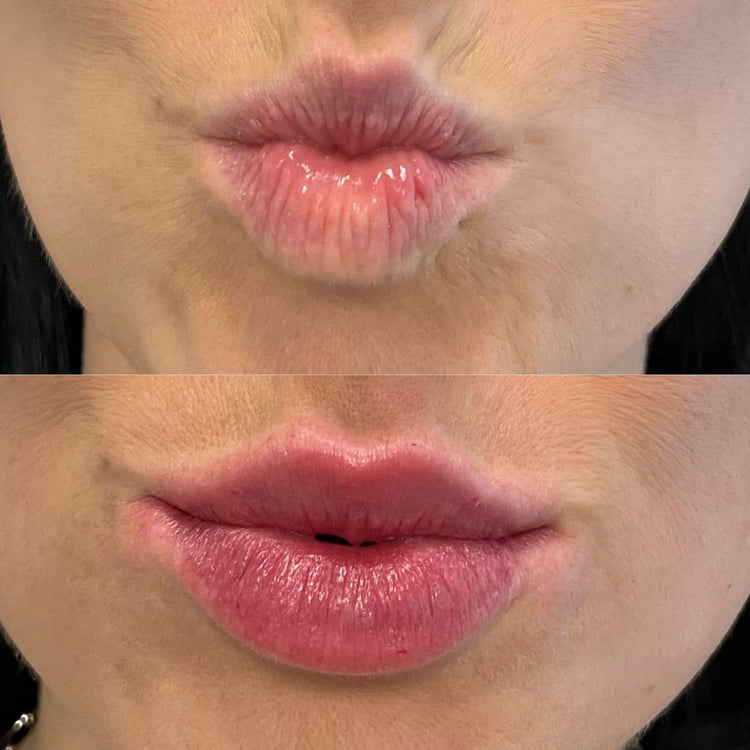How Filler Dissolving Works

Unwanted lip fillers can lead to dissatisfaction and a desire for reversal. Fortunately, filler dissolving treatments offer a solution by breaking down hyaluronic acid fillers, the most common type used in cosmetic procedures.

The Science Behind Hyaluronic Acid Fillers
Filler dissolving works by using an enzyme called hyaluronidase. Hyaluronic acid fillers are composed of gel-like substances made from hyaluronic acid, a naturally occurring substance in the body that attracts and holds water. Hyaluronidase is an enzyme that specifically breaks down hyaluronic acid molecules.
When injected near the filler, hyaluronidase starts to degrade the hyaluronic acid in the filler material. This process causes the filler to soften and gradually be reabsorbed by the body’s own tissues. The dissolved hyaluronic acid is then naturally metabolized and eliminated from the system.
Hyaluronidase: The Key Enzyme
Filler dissolving treatments are effective for removing unwanted lip fillers because they leverage a specific enzyme called hyaluronidase. Hyaluronic acid, the primary ingredient in most cosmetic fillers, attracts and holds water, creating a gel-like substance that adds volume to lips.
Hyaluronidase works by breaking down the hyaluronic acid molecules within the filler. This enzymatic action causes the filler to soften and gradually dissolve, allowing the body’s natural processes to reabsorb the hyaluronic acid. The dissolved hyaluronic acid is then metabolized and eliminated from the body.
Effectiveness of Filler Dissolving Treatment
Unwanted lip fillers can be a source of dissatisfaction for many individuals seeking to reverse unwanted cosmetic enhancements. Thankfully, filler dissolving treatments offer a solution by targeting the specific composition of hyaluronic acid fillers, the most prevalent type used in cosmetic procedures.
Success Rates and Factors Affecting Results
Filler dissolving treatment has a high success rate for removing unwanted lip fillers. Success rates can vary depending on factors such as the amount and type of filler used, the skill of the injector, and individual patient response.
Multiple treatments may be needed to achieve the desired results, and some residual filler may remain even after treatment. It’s important to consult with a qualified medical professional who specializes in cosmetic injectables to determine if filler dissolving is an appropriate option and to discuss realistic expectations for the outcome.
Several factors can influence the effectiveness of filler dissolving treatment. The type and brand of filler used plays a role, as some formulations may be more susceptible to hyaluronidase than others. The amount of filler injected also affects the outcome. Larger volumes of filler generally require more extensive treatment or multiple sessions.
The duration since the filler was initially injected can also influence results. As time passes, the filler tends to integrate more with surrounding tissues, making it potentially more challenging to dissolve completely. Patient individual characteristics like skin elasticity and metabolism can also affect the success of the treatment.
Timeframe for Removal
Filler dissolving treatments are generally effective for removing unwanted lip fillers. They work by using an enzyme called hyaluronidase, which breaks down hyaluronic acid, the primary component of most cosmetic fillers.
The timeframe for complete removal varies depending on factors such as the amount and type of filler used, individual patient response, and the number of treatments required. Typically, noticeable softening and reduction in filler volume can occur within a few days to a week following treatment. Complete dissolution may take several weeks or even months.
Potential Complications and Side Effects
Filler dissolving is a relatively safe procedure with minimal downtime compared to surgical removal methods. However, as with any medical procedure, there are potential complications and side effects that should be considered.
Common side effects of filler dissolving treatment include mild pain or discomfort at the injection site, redness, swelling, bruising, and itching. These side effects typically resolve within a few days to a week.
More serious complications are less common but can occur. They may include allergic reactions, infection, tissue damage, and asymmetry. It’s crucial to choose a qualified and experienced medical professional who is trained in filler dissolving procedures to minimize the risk of complications.
Before undergoing filler dissolving treatment, it’s important to discuss your medical history, any medications you are taking, and any potential allergies with your healthcare provider. They can help assess your individual risk factors and determine if filler dissolving is a suitable option for you.
Choosing a Qualified Practitioner
Seeking out a qualified practitioner is essential when considering any cosmetic procedure, especially one like filler dissolving.
Importance of Experience and Credentials
Choosing a qualified practitioner is crucial when deciding to have filler dissolving treatment. Experience and credentials are paramount in ensuring the safety and effectiveness of the procedure.
- Look for practitioners who have extensive experience specifically with filler dissolving treatments.
- Verify that they are board-certified in their respective medical field, such as a dermatologist or plastic surgeon.
- Inquire about their training and certifications related to cosmetic injectables.
- Read patient reviews and testimonials to get insights into the practitioner’s skill and reputation.
- Schedule a consultation to discuss your concerns and expectations, and ask questions about their approach to filler dissolving.
Consultation Process
The consultation process is an essential step in determining if filler dissolving is right for you. During this meeting, a qualified practitioner will thoroughly assess your medical history, current medications, allergies, and desired outcome.
They will examine the area where the fillers were injected, evaluate the type and amount of filler used, and discuss potential risks and benefits associated with the procedure. It’s important to ask questions about their experience with filler dissolving, the number of treatments likely needed, expected results, and possible side effects.
The practitioner will also advise you on proper pre- and post-treatment care instructions to optimize your results and minimize any potential complications. Open communication during the consultation ensures that both you and the practitioner are aligned on the goals of treatment and expectations for the outcome.
Questions to Ask During Consultation
Choosing a qualified practitioner is crucial when deciding to have filler dissolving treatment. Experience and credentials are paramount in ensuring the safety and effectiveness of the procedure.
- Look for practitioners who have extensive experience specifically with filler dissolving treatments.
- Verify that they are board-certified in their respective medical field, such as a dermatologist or plastic surgeon.
- Inquire about their training and certifications related to cosmetic injectables.
- Read patient reviews and testimonials to get insights into the practitioner’s skill and reputation.
- Schedule a consultation to discuss your concerns and expectations, and ask questions about their approach to filler dissolving.
The consultation process is an essential step in determining if filler dissolving is right for you. During this meeting, a qualified practitioner will thoroughly assess your medical history, current medications, allergies, and desired outcome.
They will examine the area where the fillers were injected, evaluate the type and amount of filler used, and discuss potential risks and benefits associated with the procedure. It’s important to ask questions about their experience with filler dissolving, the number of treatments likely needed, expected results, and possible side effects.
The practitioner will also advise you on proper pre- and post-treatment care instructions to optimize your results and minimize any potential complications. Open communication during the consultation ensures that both you and the practitioner are aligned on the goals of treatment and expectations for the outcome.
Aftercare Instructions and Expectations
Aftercare is crucial for ensuring optimal results and minimizing potential complications following filler dissolving treatment.
Post-Treatment Care Guidelines
Aftercare is crucial for ensuring optimal results and minimizing potential complications following filler dissolving treatment.
- Avoid touching or massaging the treated area to prevent further spreading of the dissolved filler.
- Apply ice packs wrapped in a towel to reduce swelling and discomfort.
- Keep your lips hydrated by drinking plenty of water and using lip balm.
- Avoid strenuous activities, saunas, or steam rooms for at least a few days post-treatment to allow the area to heal properly.
- Do not use any products containing retinol or acids on the treated area until cleared by your practitioner.
- Follow your practitioner’s instructions regarding makeup application and sun protection.
Recovery Timeline and Potential Swelling
Aftercare is crucial for ensuring optimal results and minimizing potential complications following filler dissolving treatment.
- Avoid touching or massaging the treated area to prevent further spreading of the dissolved filler.
- Apply ice packs wrapped in a towel to reduce swelling and discomfort.
- Keep your lips hydrated by drinking plenty of water and using lip balm.
- Avoid strenuous activities, saunas, or steam rooms for at least a few days post-treatment to allow the area to heal properly.
- Do not use any products containing retinol or acids on the treated area until cleared by your practitioner.
- Follow your practitioner’s instructions regarding makeup application and sun protection.
Recovery time after filler dissolving treatment can vary depending on individual factors and the amount of filler dissolved.
Typically, initial swelling and bruising subside within a few days to a week. Full resolution may take several weeks or months as the body completely reabsorbs the dissolved filler.
Swelling is a common side effect following filler dissolving treatment and is usually temporary.
It typically peaks within the first few days post-treatment and gradually subsides over the following days to weeks. Applying ice packs, elevating your head, and minimizing strenuous activity can help reduce swelling.
Follow-Up Appointments
Aftercare Instructions and Expectations are crucial for optimizing results and minimizing potential complications following filler dissolving treatment.
- Avoid touching or massaging the treated area to prevent further spreading of the dissolved filler.
- Apply ice packs wrapped in a towel to reduce swelling and discomfort.
- Keep your lips hydrated by drinking plenty of water and using lip balm.
- Avoid strenuous activities, saunas, or steam rooms for at least a few days post-treatment to allow the area to heal properly.
- Do not use any products containing retinol or acids on the treated area until cleared by your practitioner.
- Follow your practitioner’s instructions regarding makeup application and sun protection.
Follow-up appointments are typically scheduled a few days to a week after treatment to monitor healing, address any concerns, and assess the extent of filler dissolution.
- Subsequent follow-up appointments may be necessary depending on the amount of filler used and individual patient response.
- During follow-up appointments, your practitioner will examine the treated area, ask about any side effects or concerns, and determine if additional treatment sessions are required.
- Xela Rederm Skin Booster Treatments Near Pyrford, Surrey - January 24, 2026
- Xela Rederm Skin Booster Treatments Near Chipstead, Surrey - January 23, 2026
- Why Vape Enthusiasts Love The Vessel Craftsman Series - January 22, 2026
